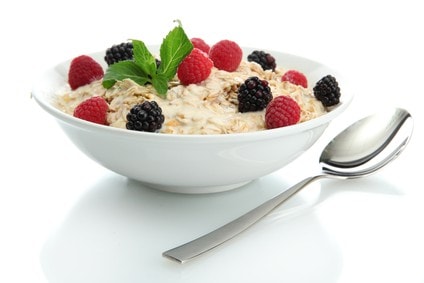Does Oatmeal Belong In a Gout Diet?
Many gout sufferers ask if oatmeal is good or bad for them since it contains some purines. I can’t help but chuckle when I hear that. The truth is oatmeal and all types of oats are good for you in a gout diet, you have nothing to be worried about unless you are allergic to oats and that is a different story altogether.
As long as it’s not processed or refined with sugars; what we are talking about is whole grain oats. Oatmeal is a type of cereal which is not high in proteins or purines and may be consumed by any person that has high uric acid levels. Unless you suffer from purine metabolism problems and conditions related to high uric acid, there is no reason to avoid oatmeal.
Instead of eliminating oatmeal from your diet, you can talk to your doctor about consuming smaller portions. Your average healthy person consumes around 600 to 1000 mg or purines a day through their diet. Your doctor may recommend that you reduce your daily purine consumption to about 100 to 150 mg a day.
Oatmeal is high in minerals like manganese, molybdenum, phosphorus, copper, biotin, chromium and magnesium. It is also an excellent source of fiber which helps with your stool. I personally always begin my day with either whole grain oatmeal with a teaspoon of raw honey to sweeten it up a little boiled in skim milk or I have two slices of whole wheat bread with some natural peanut butter spread on top. Sometimes I’ll add some cacao bits or grounded flax seeds on top! But nothing energizes you in the morning and fills up your tummy with then a steaming bowl of freshly cooked oatmeal.
Fiber is the hero
Oatmeal lowers cholesterol by removing the bad cholesterol which may translate into a decreased risk of developing heart disease, type 2 diabetes since oatmeal may stabilize blood sugar levels and high blood pressure which are all interrelated with gout. Oatmeal may also enhance immune response and the high fiber content in oatmeal may lessen the risk of developing cancer through what we call plant lignans, which are converted by intestinal flora into mammalian lignans that may protect us from different types of cancers.
Remember one cup of oatmeal has about 4 grams of fiber and only 130 calories. It stays longer in your stomach making you feel fuller. If you add blueberries, strawberries, raspberries or any other type of fruit in your bowl of oatmeal, you add even more fiber in your gout diet! Isn’t that great?
Oatmeal is considered slightly acidic like most grains are but that does not mean that it’s a acid forming food and remember that all foods contain an acid-alkaline balance and you can determine if foods are acid or alkaline or if they’re acid or acid forming foods. Oatmeal is an acidic food which neutralizes the acids in the stomach helping your body maintain its pH balance.
In Dr. Choi’s 12 year study involving some 47,150 men found that meats like beef, lamb, pork, poultry and fish increased gout risk but purine-rich vegetables and grains like oatmeal were not found to increase gout risk at all. Dr. Choi stated: “We don’t clearly understand the ‘whys,’ and there are several possible explanations.
It might be there’s a different type of purines in meats and seafood than in vegetables, or different foods have different levels of purines. Or maybe the body absorbs purines differently, depending on the food type.” The role of purines in food has long been suspected in gout but to this very day, it is still has not been proven.
If you buy prepared oatmeal products such as oatmeal, look at the ingredients to make sure that the product does not contain any sugar, salt or other additives. Store oatmeal in an airtight container in a cool, dry and preferably dark place where they will keep for approximately two months.

